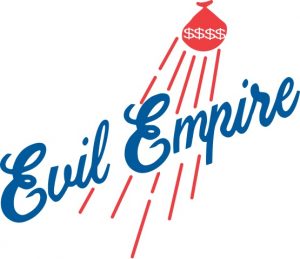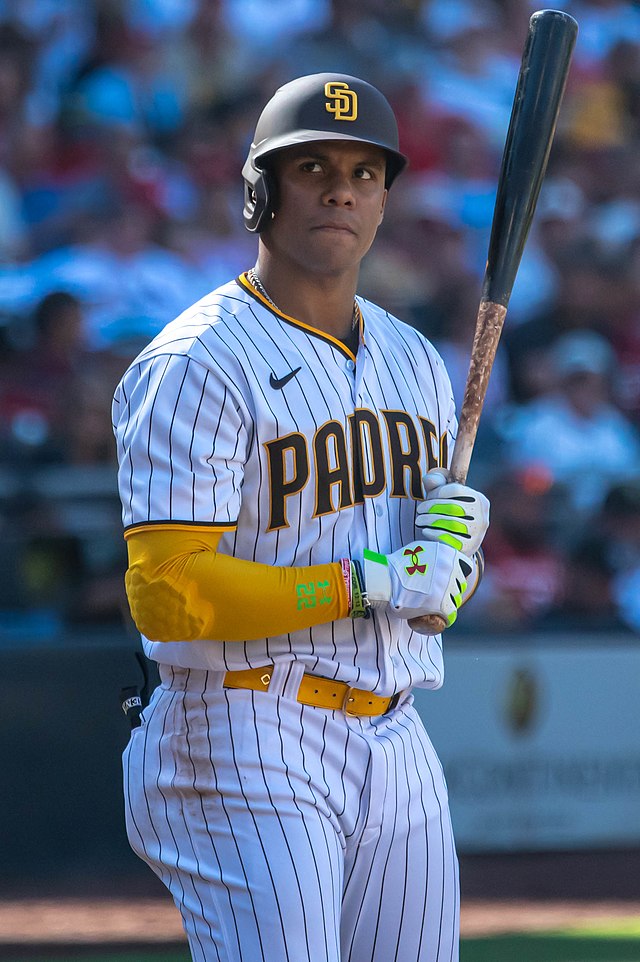[Logo Credit: Chlorineer via Wikimedia Commons]
If there was one thing that seemed out of place in 1996 and 1998 it was that people around the country seemed to be rooting for the Yankees. Ninety-six was the team’s first visit to the World Series in fifteen years and there was the feel good story surrounding Joe Torre and his brother Frank, and in 1998 there was an industry-wide admiration not just for the completeness of that team but also for the way it had been built, largely from within and with shrewd trades as opposed to the failed free agency buys of the late ’80s and early ’90s. These Yankees were beloved. And it didn’t feel quite right.
After four World Series titles in five years, however, the act wore thin. And when the Yankees lost to the Angels in the 2002 Divisional Series and responded by signing Japanese slugger Hideki Matsui and Cuban pitcher José Contreras, Boston Red Sox president Larry Lucchino had had enough. “The evil empire,” he famously said, “extends its tentacles even into Latin America.”
He was angry and defeated, so we’ll forgive his mixing of metaphors, but he gave yet another nickname to the team that already had more than any other in baseball. No longer just the Pinstripes or the Bronx Bombers, they’ve now been known as the Evil Empire for the past two decades, and for most of those twenty-one years, the name has made sense.
When the team missed the playoffs in 2008, they opened the vault and spent quickly and decisively, signing free agents Mark Teixeira, C.C. Sabathia, and A.J. Burnett. The result was beautiful on field and off. They won the 2009 World Series, and they were the villains again. Order was restored to the universe.
So after last year’s disappointing season it wasn’t surprising that Brian Cashman pulled the trigger on the Juan Soto deal, and most expected the 25-year-old Japanese superstar Yoshinobu Yamamoto to be next, simply because that’s who the Yankees are. They are the Evil Empire.
But suddenly they aren’t.
No one was the least bit surprised when the Dodgers signed Shohei Ohtani, but there were some audible gasps when word of the $700 million contract — by far the largest ever — was announced. It was a big number, but it didn’t really change the expected narrative of the post season. The Dodgers got their man, and soon the Yankees would get theirs.
Everything changed, however, when we learned that Ohtani would be deferring a staggering 97% of his salary. The Dodgers were getting a Rolls Royce for the price of a Pinto, so why not go shopping for a Maserati?
By following up the Ohtani deal with Yamamoto, the Dodgers did more than just strengthen their rotation while stealing a pitcher from the Yankees. They announced to the baseball world that they are the new Evil Empire. Not satisfied with being the best regular season team in baseball over the last several seasons and apparently no longer willing to subject themselves to the random chance of the postseason, the Dodgers used their deep pockets and their deep farm system to bolster a team that won 100 games in 2023.
With Ohtani, Mookie Betts, and Freddie Freeman, the Dodgers lineup will feature the reigning A.L. MVP and the second and third place finishers in the NL MVP voting, and Yamamoto will headline a rotation that also includes another newcomer, Tyler Glasnow.
That embarrassment of riches would be enough to turn the stomaches of every small market fan in America, but the truly evil — or genius — aspect of all this is the subversive innovation of Ohtani’s contract. Ohtani has been called a unicorn for his unprecedented combination of hitting and pitching, but he’s also unique in another sense. With an endorsement portfolio that dwarfs every other player in the game, he is one of the few athletes in the world, certainly the only baseball player, who doesn’t need a salary. There will be at least twelve Dodgers who will earn more money than Ohtani in 2023.
All of this is something the Yankees might once have been expected to do, but times have changed. As news broke of Yamamoto’s signing, criticism of Hal Steinbrenner and Brian Cashman immediately swelled, but I find it difficult to lay any blame on them. Reports indicate that the Yankees offered a ten-year contract for $300M, less overall money but with a higher annual average and an earlier opt out than the Dodger deal. If had only been about the money, that Yankee offer would have made more sense.
Some fans have suggested they should’ve gone to $350M or higher, but it’s understandable that Steinbrenner and Cashman showed some restraint. It isn’t my money, but thirty million dollars a year already seems a bit high for a player who has neither stood on a major league mound nor held a major league ball. Also, there have been reports that Yamamoto simply always wanted to be a Dodger, and that the large Japanese community in Los Angeles as well as the shorter flight home to Japan both played a part as well. It’s highly possible that he was never going to sign with either New York team.
The question now for the Yankees is simple. What next? With Gerrit Cole the only sure thing in the starting rotation, will Cashman pursue Blake Snell or Jordan Montgomery? Will he instead try to build a super bullpen to cover for rotation deficiencies? Will he do both?
Only time will tell, but there’s one thing we know right now. The Yankees are no longer the Evil Empire.









 Yeah, this pretty much had to happen; Yanks sign native Noo Yawka
Yeah, this pretty much had to happen; Yanks sign native Noo Yawka 


 Sooo… how ’bout that weather?
Sooo… how ’bout that weather?








